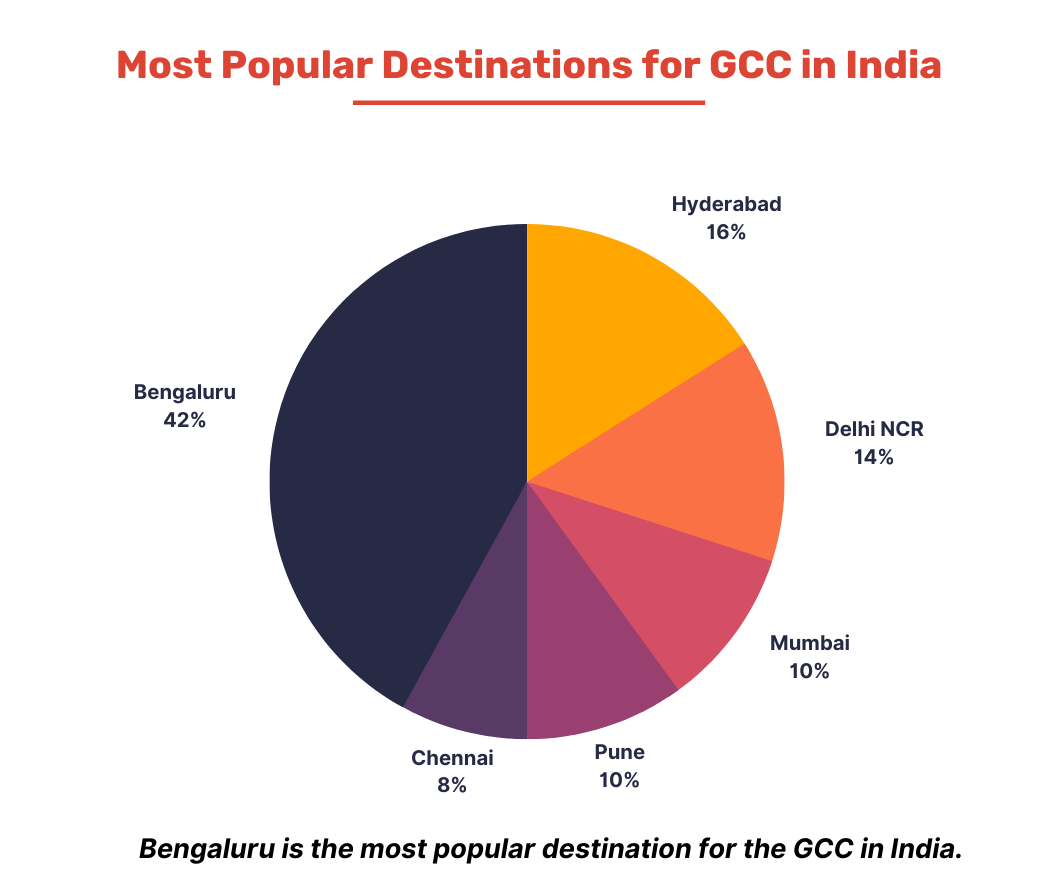Global Capacity Centres (GCCs) in India and everywhere else around the world have emerged as crucial drivers of value creation, cost optimization, and operational efficiency in today’s business landscape.
These centres play a pivotal role in harnessing the advantages of global/local talent, technology, and strategic location. GCCs optimize value, reduce costs, and enhance operations, all while navigating the challenges posed by a constantly changing environment.
What is a Global Capacity Centre?
Global Capacity Centres (GCCs) have evolved from their initial conception as cost centres to becoming pivotal components of a company’s value chain.
In the early stages, GCCs were primarily established to reduce operational costs by offshoring certain business functions to regions with lower labour costs. However, this approach has significantly transformed over the years.

Today, GCCs are recognized as strategic hubs within multinational organizations. They have transcended their cost-cutting origins and have taken on broader responsibilities, including driving innovation, fostering collaboration, and contributing to their parent companies’ competitive advantage.
GCCs are no longer seen as mere back-office support but as integral parts of the global business strategy.
The Changing Business Environment
The business environment in which GCCs operate has experienced dramatic shifts. These shifts are characterized by:
- Technological Disruptions: Rapid advancements in technology, such as artificial intelligence, data analytics, and the Internet of Things, have revolutionized industries. GCCs must adapt to and leverage these technologies to remain competitive.
- Shifting Consumer Preferences: Consumers today are more informed, connected, and demanding. GCCs need to align their strategies with changing consumer behaviours and preferences, ensuring they offer products and services that resonate with the market.
- Geopolitical Uncertainties: GCCs often operate in regions susceptible to geopolitical tensions. Navigating these complexities while maintaining operational continuity is a challenge they must address.
- Globalization: The global market is more interconnected than ever before. This offers opportunities for expansion but also requires GCCs to develop strategies for entering new markets while complying with local regulations and cultural nuances.
What are Global Capacity Centres in India?
Global Capacity Centres in India are specialized offshore or nearshore units established mostly by multinational corporations (MNCs) to leverage the country’s skilled workforce, cost-efficiency, and favourable business environment.

These centres serve as extensions of the parent company’s operations and are located in various cities across India.
India’s Global Capacity Centres (GCCs) have evolved significantly over the past two and a half decades, transforming from being favoured offshore destinations for Business Process Outsourcing (BPO) into hubs of tech-enabled innovation.
Initially known for their language proficiency and process intelligence, these GCCs now lead the way in providing end-to-end solutions to global problems.
Global Capacity Centres in India are different from BPOs as they enable India to continuously create value and make a significant impact through innovation. According to a survey by Axis Capital (India Strategy Report, 7 August 2023), the number of Global Capacity Centres in India has doubled between 2012 and 2023, with a 280,000 increase in headcount in just the first half of 2023.
Over 1.7 million employees currently work in GCCs, rivalling or even surpassing tier-1 IT companies, with a Compound Annual Growth Rate (CAGR) of 12.1% between 2018 and 2023.
These centres have been instrumental in India’s economic growth, offering high-quality employment and contributing to the country’s GDP. Their presence spans various sectors, including technology, engineering, and consulting.
India’s abundant pool of skilled professionals, cost-effectiveness, supportive government policies, and robust infrastructure have made it the preferred destination for GCCs, resulting in India housing the largest cluster of Fortune 500 GCCs globally.
Growth of GCCs In India
Global Capacity Centres in India have transitioned towards high-value activities such as IP creation, emerging technology competency building, setting up Centres of Excellence (COEs), and taking full ownership of vendor management. They have integrated deeper into the Indian ecosystem through partnerships with startups, universities, and service providers.
“By 2025, Global Capacity Centres in India are projected to employ 2 million people and be worth $60 billion in market size.”
- June 2023 edition of the NASSCOM-Zinnov biennial titled ‘GCC 4.0: India Redefining the Globalization Blueprint’
According to JLL’s GCC guide 2023, cities like Bengaluru, Hyderabad, Delhi NCR, Mumbai, Pune, and Chennai are the most popular destinations for Global Capacity Centres in India with their infrastructure, access to talent, and supportive ecosystem.

Global Capacity Centres in India have transitioned from being BPO centres to innovation hubs that play a pivotal role in solving global problems. Their continuous growth and evolution are driving India’s journey towards becoming a $5 trillion economy while contributing to technological advancements and economic resilience on a global scale.
With Akssai’s team of experts in consulting and IT transform your business operations.
Why are the Global Capacity Centres important in India?
Global Capacity Centres are important in India due to the country’s cost advantages, vast talent pool, skilled workforce, language proficiency, supportive government policies, business-friendly environment, and opportunities for innovation and collaboration.
India has established itself as a global hub for GCCs, attracting multinational corporations from various industries to leverage these advantages for cost optimization and operational excellence.
What is a GCC and how does it work?
The answer to the question of what the operating model of Global Capacity Centres in India and everywhere else in the world is can vary depending on the specific needs and objectives of the parent company. However, there are common elements that define the typical operating model of GCCs:
- 1. Strategic Alignment: GCCs align their operations closely with the strategic goals and priorities of the parent company. They work in collaboration with the headquarters to ensure that their activities support the overall business strategy.
- 2. Scope of Functions: GCCs handle a wide range of functions, which can include IT services, research and development, engineering, finance and accounting, human resources, customer support, data analytics, and more. The specific functions depend on the industry and business objectives of the parent company
- 3. Talent Acquisition and Development: GCCs focus on talent acquisition to build a skilled workforce. They often recruit from local universities and tap into India’s large pool of talent. Employee development and upskilling programs are integral to GCC’s operating models to ensure a high level of expertise.
- 4. Cost Optimization: Cost efficiency is a key driver for establishing GCCs. They leverage India’s cost advantages to provide high-quality services while optimizing operational costs. This includes labour cost savings and cost-effective infrastructure.
- 5. Operational Excellence: GCCs are expected to deliver operational excellence by streamlining processes, adopting best practices, and optimizing efficiency. They continuously work on improving processes and achieving operational efficiency.
Global Capability Centres Transformation
- 1. Innovation and Research: Many GCCs are involved in research and innovation activities. They work on cutting-edge technologies, product development, and solutions that contribute to the parent company’s competitiveness and growth.
- 2. Risk Mitigation: GCCs provide geographic diversity and risk mitigation for the parent company. They serve as backup centres in case of disruptions in the parent company’s home country, ensuring business continuity
- 3. Collaboration and Partnerships: GCCs often collaborate with local startups, universities, and service providers to foster innovation and access specialized expertise. These partnerships contribute to the centre’s ability to drive innovation and solve complex problems.
- 4. Scalability: GCCs are designed to be scalable. They can expand or contract their operations based on the evolving needs of the parent company. This scalability allows them to respond quickly to changes in the business environment.
- 5. Digital Transformation: Many GCCs are at the forefront of digital transformation efforts within their parent organizations. They adopt and implement advanced technologies such as artificial intelligence, machine learning, automation, and cloud computing to enhance operations and services.
Akssai, with its offices across 13+ cities in India, provides impactful solutions to businesses.
What is the role of Global Capacity Centres?
Global Capability Centres play a multifaceted role within organisations, encompassing cost optimization, operational excellence, talent development, innovation, risk mitigation, and strategic functions.

Their contributions are essential in supporting their parent organizations’ global operations and competitiveness. Some of the crucial roles of GCC are:
Optimizing Value in GCCs
Talent Acquisition and Development
Talent acquisition and development are critical for optimizing value within Global Capacity Centres in India. To attract, nurture, and retain top-tier talent, these centres employ innovative strategies such as:
- Tailored Recruitment Approaches: GCCs design recruitment processes that resonate with local talent pools, leveraging cultural insights and market-specific strategies to attract the best candidates.
- Continuous Learning and Development: Investment in employee development through training programs, workshops, and educational partnerships ensures that GCC teams are equipped with the latest skills and knowledge
- Cultivating a Positive Work Culture: GCCs focus on creating a workplace culture that fosters collaboration, creativity, and inclusivity, making it an attractive destination for talent.
Innovation and R&D
Global Capacity Centres in India play a crucial role in driving innovation and research and development (R&D) activities for their parent organizations. They achieve this by:
- Establishing Innovation Labs: Many GCCs have established dedicated innovation labs where teams can experiment with emerging technologies and create groundbreaking solutions.
- Collaborating with Local Ecosystems: Building partnerships with local universities, startups, and research institutions allows GCCs to tap into external innovation sources and leverage local expertise
- Prototyping and Proof of Concept: GCCs often engage in rapid prototyping and proof-of-concept projects to test new ideas and technologies, reducing the time to market for innovative solutions.
Strategic Partnerships
Strategic partnerships are a key driver of value for Global Capacity Centres in India. These collaborations can take various forms:
- Academic Collaborations: Partnering with universities allows GCCs to access cutting-edge research and a pool of fresh talent.
- Startup Engagement: GCCs often engage with startups through incubation programs, investment, or collaboration on disruptive projects.
- Vendor Relationships: Building strong relationships with local vendors can enhance supply chain efficiency and reduce costs.
- Industry Alliances: Joining industry-specific associations or alliances provides opportunities for benchmarking and knowledge sharing.
Cost Optimization in GCCs
Global Capacity Centres in India and abroad play a crucial role within corporations by serving as specialized offshore or nearshore units. Their roles can vary depending on the specific objectives of the parent company, but here are some common functions and roles of GCCs:
Economies of Scale
Leveraging economies of scale is central to cost optimization in Global Capacity Centres in India. Key strategies include:
- Centralized Operations: GCCs centralize specific functions, such as finance, HR, or IT, consolidating tasks to reduce duplication and achieve cost efficiencies.
- Shared Services: Implementing shared service centres streamlines processes across the organization, reducing operational costs while maintaining or improving service quality
- Vendor Consolidation: GCCs often consolidate vendor relationships to negotiate better pricing and terms, resulting in cost savings.
Process Automation and Digital Transformation
Automation and digital transformation initiatives are instrumental in reducing operational costs and improving efficiency within GCCs. These initiatives include:
- Robotic Process Automation (RPA): Automating repetitive, rule-based tasks frees up human resources and reduces errors.
- Data-Driven Decision-Making: Implementing advanced analytics and data-driven tools allows GCCs to optimize processes and allocate resources more effectively.
- Cloud Computing: Migrating to the cloud can reduce infrastructure and maintenance costs while providing scalability and flexibility.
Right Location and Talent
Selecting the right location is a critical aspect of cost optimization for GCCs. Considerations include:
- Labour Cost Analysis: Analyzing labour costs in potential locations to find the right balance between cost savings and skill availability.
- Infrastructure and Connectivity: Assessing the quality of infrastructure and connectivity to ensure seamless operations.
- Access to Markets: Evaluating the proximity to target markets and customer bases to facilitate business expansion.
Enhancing Operational Efficiency in GCCs
Lean Operations
Adopting lean principles is essential for operational efficiency in GCCs. This involves:
- Process Streamlining: Identifying and eliminating inefficiencies in processes to reduce waste and enhance productivity.
- Continuous Improvement: Establishing a culture of continuous improvement and encouraging employees to suggest enhancements.
- Customer-Centric Approach: Focusing on meeting customer needs efficiently to enhance service quality.
Data Analytics and Performance Metrics
Data analytics and performance metrics play a vital role in operational efficiency by:
- Real-time Monitoring: Using data analytics to monitor operations in real-time, enabling rapid responses to issues.
- Key Performance Indicators (KPIs): Establishing KPIs and benchmarks to measure performance and identify areas for improvement.
- Predictive Analytics: Utilizing predictive analytics to anticipate potential disruptions or inefficiencies and take proactive measures.
Risk Management
Effective risk management is crucial for GCCs, given their global operations. This includes:
- Risk Assessment: Identifying potential risks, both internal and external, and evaluating their impact.
- Contingency Planning: Developing robust contingency plans to mitigate the impact of unforeseen events.
- Compliance and Governance: Ensuring adherence to regulatory requirements and ethical standards to avoid legal and reputational risks.
What are the benefits of Global Capacity Centres?
Global Capacity Centres in India and abroad offer a range of benefits, including cost savings, access to talent, operational efficiency, risk mitigation, innovation, and scalability. These advantages make GCCs valuable assets for organisations seeking to optimize their operations and competitiveness on a global scale.
Conclusion
Global Capacity Centres in India and around the world have undergone a remarkable transformation from cost centres to strategic assets. In an ever-changing business environment marked by volatility and disruption, they play a pivotal role in optimizing value, reducing costs, and enhancing operations for their parent organizations.
Akssai aims to capitalize on the benefits of opening Global Capability Centers (GCC) and tapping into India’s vast talent pool. With our current presence in 13+ cities. We have plans to expand to over 200 offices nationwide within the next two years.
At AKSSAI, We Have Customized Our Solutions for Your Business
Akssai aims to capitalize on the benefits of opening Global Capability Centers (GCC)











